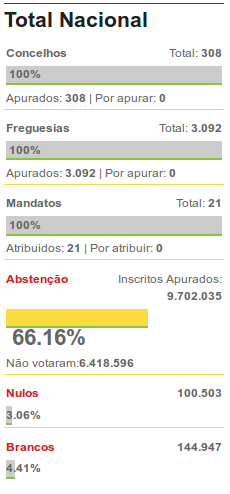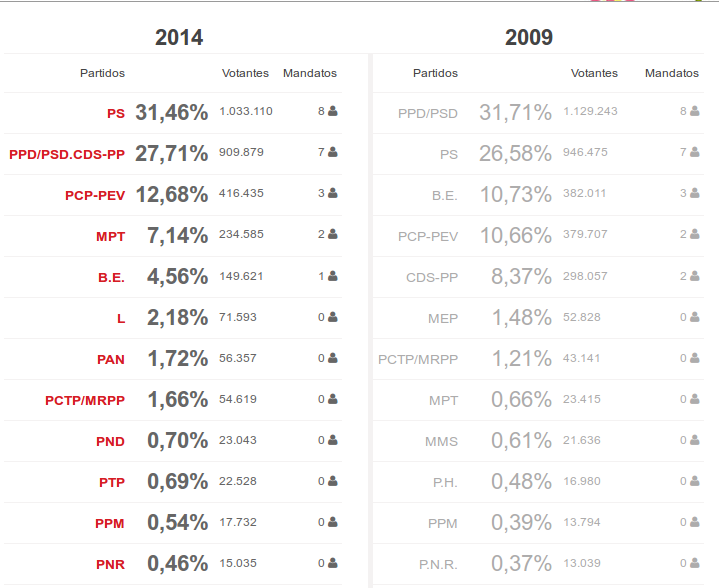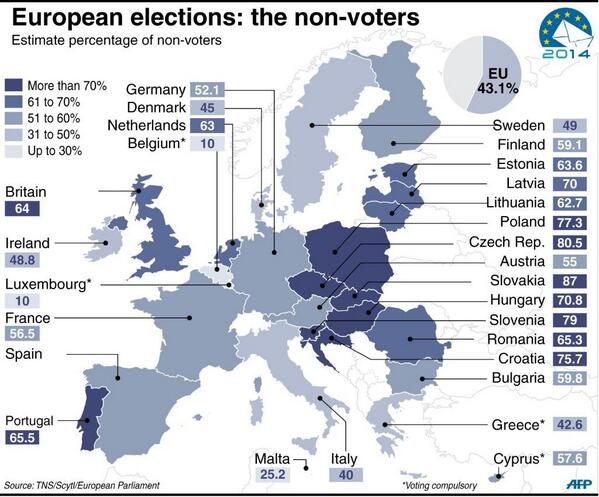How do you see the results in Europe, in general?
The election results are, in general, worrisome. Far-right and nationalist parties won in several countries (Denmark, France, England, Austria), and increased their presence in the European Parliament (EP). Another striking feature of these elections (which also happened in 2009) is the abstention rate, which was between 50% and 80% in many countries. The liberals and “socialists” (ex-social-democratic) have, in general, maintained their position in the EP. However, left parties in Spain increased their votes and in Greece Syriza won the elections (with Neo-nazi Golden Dawn in third).
What can we make of this?
Well, to begin with, this should be a wake-up call to all the left, not to underestimate the potential danger of the far-right in the years to come. It should serve as well for a deep and open self-criticism to left parties and their leaderships who, in general, have been increasingly moving into social-democratic positions, even when capitalism presents one of its biggest crises in history.
“What can we make of this? Well, to begin with, this should be a wake-up call to all the left…”
Another conclusion we can draw is the distrust that politics in general has amongst the population. Politics is seen as a dirty business mired in corruption, and a separation between the politicians and the electors. This feeling leads to massive abstention rates and the appearance of populists and mediatic politicians (like Beppe Grillo in Italy).
Another factor which makes me question the work the left has done so far is the “lack of punishment” the so-called centrist parties (liberals and “socialists”) have received after 3 years of austerity. Even in the southern European countries the Left was not able to get many votes from them, with the exception of Syriza.
How is the situation in Portugal? There were comments on the increase of abstention and blank/spoiled ballot papers. Did the parties actually increase their number of votes?
In Portugal, the abstention rate went up to 66% from 63% in 2009. You can see the the voters’ turnout in the figure on the right. The causes for these high percentages are more or less the same as in the rest of Europe: feeling of not being represented, political alienation and distrust to politics in general.
And in absolute terms, the results can be seen below.
“Another factor which makes me question the work the left has done so far is the “lack of punishment” the so-called centrist parties (liberals and “socialists”) have received after 3 years of austerity.”

PS (“Socialist” Party), PSD+CDS (the right-wing government coalition), PCP-PEV (Communist Party – Greens alliance), BE (Left Bloc), MPT (center-right populist with a mediatic candidate).
I think that BE lost its votes to PCP-PEV and LIVRE (a new center-left party). The MPT received protest votes from PSD and CDS electors. And PS grew at the expense of PSD electors who are angry at the current government.
In total, the parties didn’t have as many votes, but it was nothing extraordinary. Typically, the participation in European elections is less than in the national elections, because people feel that EP has little to no power and it’s an institution very distant from the workers’ daily life.
There is a growing concern about the rise of extreme right. Do you share these concerns? How do these concerns translate into the Portuguese election results?
I’m extremely concerned about the rise of fascist and nationalist ideas across Europe. It remains to be seen how the victories mentioned earlier will translate in terms of social struggle. Will anti-immigration speech increase? Will fascist organizations start to act like Golden Dawn, killing immigrants in France, Austria, etc.? Or will these parties, once in the European Parliament participate in milden their policies to melt into an inside-the-system attitude? Marine Le Pen has already called for the resignation of the French government, which definitely arises a concern for the immigrants living in France.
Fortunately, in Portugal there isn’t still a well-known far-right party. The nationalist PNR had 15,000 votes, increasing only by 2.000 votes since 2009. We have to keep an eye on them, but at the moment they are not a threat, in terms of electoral success. However, these victories can encourage fascists into being more aggressive towards immigrants and activists. That is something which must not be discarded, and everywhere the left must be organized to fight against this possibility.
How are the results of radical left? And how are the results for radical left? What do you think is the most important self-criticism that should be done at this moment?
If by radical left, you mean the extra-parliamentary left, then its results were low, as expected (less than 3% in total). Their campaign did not add anything essentially new to the debate and the lack of criticism to capitalism. And the failure to point out an alternative society and political system only made it worse for them, electorally speaking. MRPP (Maoists) talked about leaving the Euro (inside capitalism) and the cancellation of the debt (a proposal I support). The new party MAS (Morenists) concentrated all their campaign in criticizing the “politicians'” privileges and corruption, pointing it as the main cause for the crisis instead of seeing it as a symptom of the peripheral position of Portugal in the imperialist EU.
“These results (at the European level) should indicate, to the Left, that a change in program, perspectives and political practice must occur in order to fight the increase of the far-right and the neoliberal agendas of the EU and pro-capitalist governments.”
If we talk about the parliamentary left, in Portugal its results were mixed. On one hand, PCP-PEV (from Stalinist tradition) increased their number of votes and elected one more deputy than in 2009. They based their campaign in criticism of EU, a patriotic propaganda as a response to the crisis and pushing the Europe of the bosses away – however never clearly criticizing the capitalist system. On the other hand, BE (Left Bloc, from Maoist and Mandelist traditions) lost over 50% of votes compared to 2009. It was a huge defeat for them. They only re-elected one deputy. In part this can be explained by the newly-formed party LIVRE, whose leader was independent who ran for BE in 2009. BE’s campaign was centered around a critique the fiscal and debt policies of EU and a bit about the European Fiscal Compact. However, they fail to criticize EU clearly, pretending to “change it from the inside”. That position and previous internal instability help explain this bad result.
Sometimes one must fall in order to really analyze the positions and practice taken until that time. These results (at the European level) should indicate, to the Left, that a change in program, perspectives and political practice must occur in order to fight the increase of the far-right and the neoliberal agendas of the EU and pro-capitalist governments. Until now, in Portugal, the parliamentary left has been mostly…parliamentary. The Communist Party has a presence in the trade unions and, through it, it’s involved in hundreds of small struggles. BE has practically no coherent presence outside the parliament – that can also be a reason for its downfall. I think that both these parties and also the extra-parliamentary left don’t show a clear alternative to the actual system and continue to be too tied to a bourgeois way of doing politics. This is the most important self-criticism the Left should do.
“Until now, in Portugal, the parliamentary left has been mostly…parliamentary.”
In the long run, we cannot predict what will happen with these parties. BE is in the most precarious position of all. Something has to change until next year, in order for BE to remain a strong left force. The Communist Party will probably celebrate this small victory and won’t change its practice because, well, it ‘won’ an extra deputy and parliamentary democracy is the focus.
In conclusion, I feel that the Left is atomized, with low morale and unable to present a real alternative to the workers. It should look carefully at these results and start preparing for the possible social turmoil that will arise with the increase of far-right and nationalist activity all over Europe.
Editorial note: João belongs to Socialismo Revolucionário, a small political collective which is also part of CWI – Committee for a Workers’ International. Perhaps as importantly, he actively participated in the recent mass demonstrations when millions marched against Troika policies.

